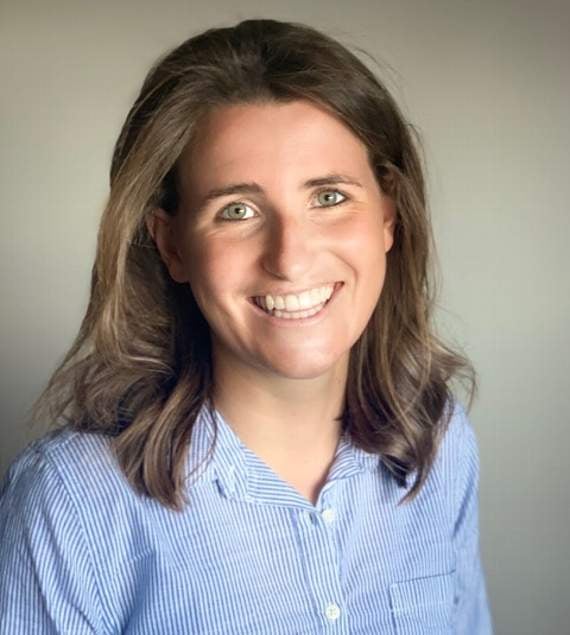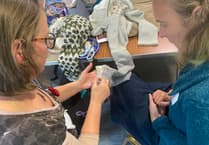A YOUNG hospital matron who grew up in the Okehampton area has shared her experiences of being in charge of a high pressure intensive care unit at a central London hospital at the height of the coronavirus outbreak.
Lily Davies, 28, whose family home is Sticklepath, talks calmly about the drama that unfolded around her — as the 170-nurses she oversees found themselves caring for the dying in conditions which they couldn’t have imagined just a few weeks before.
There were shortages of PPE to contend with, as the beds on the unit doubled. Nurses worked extra shifts to care for people who could not be left for one second. Even calling for extra help was not easy or straightforward, as all the medical staff were gowned up in masks and visors.
Many of these critically ill patients were sadly going to die, but, unusually their relatives were not able to say goodbye, because of the infection risk. Video calls became the way the nurses arranged for relatives to see their loved ones for the last time.
There were good things too, though. At the height of the crisis Lily remembers ‘everyone at the hospital was just so kind to each other’. She remembers the man who delivered pastries to the hospital for the staff each morning, the lunches supplied by local restaurants and the ‘clapping for the NHS, that was lovely’.
The other thing which stood out, she says, was how the hospital staff pulled together, with nurses, medical staff and porters from other parts of the hospital coming together within the ICU unit to help the nurses there care for the dying.
The first hint of what was to come came, Lily recalls, was back in January when, on holiday in South Africa, she read about coronavirus at the side of the pool.
‘I remember being on a sunlounger reading about Covid-19 and thinking “this is going to become a thing” she recalls. ‘Then, when I landed back in the UK and went into work the meetings started.’
At that time, though, in the middle of February, no one, the Government and medical authorities included, knew how quickly things would escalate.
‘It went from thinking we were going to have three patients to something extraordinarily different and then two weeks after that we had our first Covid patient at the end of February,’ said Lily. ‘From then it changed quite drastically overnight.
She added: ‘What I found really hard psychologically at that point is that we were starting to see patients and we were being told how hard it was going to be in the hospital but when I walked outside the hospital life was just going on as normal. I remember going home on the tube after a shift and saying “Oh my God, no one has any idea”. It was a good few weeks like that.
‘We were seeing what was happening in Italy, where their initial admissions were for the elderly, but then they had their peak and they were seeing a lot of younger people, but they didn’t have the capacity within the ICU. We were quite scared, looking at that, realising we were going to have younger people.’
Then the peak happened, and there wasn’t time for Lily or her team to be scared anymore.
‘We were more than full,’ she say. ‘We doubled our capacity in intensive care which meant each nurse had to care for more than one patient, which would be usual in the ICU. And these patients were incredibly sick, very unstable, with a risk of multiple organ failure. We couldn’t communicate easily and we couldn’t call for help quickly as getting into the PPE takes time.
‘The PPE was a huge issue. We never had enough. We were constantly having to try to source more PPE and that was time consuming and rather scary because it was so unpredictable. We would be told were were going to get a delivery of masks that day and then they wouldn’t turn up.’
One of the issues, she says, was that a lot of the specialist PPE that the hospital generally relies on comes from Germany and when the crisis started, the Germans stopped exporting it.
Despite the situation, Lily says, once the country at large recognised the seriousness of the situation and the lockdown was implemented ‘it actually got easier psychologically’.
‘Once we got to the peak the atmosphere in the hospital was like I have never witnessed before. Everyone was so kind. We had so many people being kind. There was one man delivering pastries and we had people bringing us lunch. There was all the clapping which was lovely.
‘We have 170 nurses in the ICU but in the surge we were extremely fortunate in that we had a number of different disciplines come and help us out. We had physios helping to roll patients, porters delivering the PPE, all these teams working together. It was a massive upskilling task.
‘You can never leave an intensive care patient because they are so incredibly unstable and because of the number of infusions they need. And it was even more challenging because of the PPE needed with coronavirus. Getting out PPE became incredibly difficult because there was no one to help. But people never complained, they just cracked on it it.’
The crisis was intense but, looking back, relatively short-lived. Lily’s ICU hasn’t seen a coronavirus patient now since May.
She says the experience has made the hospital workforce stronger, although some of her nurses have since suffered psychological traumas.
‘I think my team is better off and my relationship with the medical staff and the consultant body has grown enormously, because we have all been through something together which you can only understand if you were there,’ she says.
‘I think the hardest and worst thing of all was not being able to have relatives in the ICU unit, because of the infection risk, and yet many of these patients were dying.’
The deterioration of coronavirus patients who were admitted to the ICU was very sudden, she says.
‘A patient would be walking and talking, then they would suddenly collapse,’ she said. ‘They would then be brought to us in the ICU. Because of the risk to the public we were not having any relatives or visitors coming in, and how relatives have been able to cope with not seeing someone before they die I really don’t know.
‘In intensive care most of the patients can’t speak so the communication is usually with the relatives. We were trying to do video calls but it was just not the same for them.
‘We lost quite a few patients,’ she adds. ‘Death after death. We had to have a portable mortuary that was put up because there was so many.’
Lily, who lives with her French boyfriend Thibaut in London, says she was glad she was able to go home at the end of her shifts, to retain some sort of normality.
Some staff had to put up in hotels or hospital accommodation for the duration of the crisis, though, because of family members who were sheltering at home. Unsurprisingly, some of Lily’s staff have suffered psychologically because of what they have been through. ‘I’m fine, but I didn’t do too much clinical stuff, I was overseeing the wards.
‘Some of the nurses are struggling and it is quite interesting because it is the staff who I wouldn’t necessarily have thought would struggle, who have been having nightmares and flashbacks.
‘It is very traumatic for them, because they feel they didn’t give the care they wanted to, even though they did everything they possibly could do, because of the quantity of patients we had and the shortage of equipment.
‘There were things we couldn’t have foreseen before the surge.
Basic things, like the cleaners were incredibly scared and didn’t want to get Covid from cleaning, so the nurses were having to do it. This was something I wouldn’t have thought of before. Things like how we dispose of all the rubbish, because we had so much, and we had to have careful infection control.’
Lily is the daughter of Okehampon vet Philip Davies, who recently retired from Ockment Veterinary Centre, where he has spent his entire career.
One of Lily’s two older sisters Amelia also experienced the Covid-19 crisis firsthand, as she works as an anaesthetist at a hospital in Bath.
Lily, who went to South Tawton Primary School as a child, had family inspiration for her choice of career, as her mum Kim was a nurse in the Okehampton area. She sadly died of cancer in the year Lily qualified as a nurse.
After doing a nursing degree at Birmingham University, Lily came to work at the central London hospital trust where she still works and has been matron of the ICU unit for two years.
She says the crisis has only strengthened her belief that she has chosen the right career.
‘I do really enjoy it. I think being a matron is a lovely job, because you get a balance of different things. And ICU nursing is also a reality check, you forget how fortunate you are and it brings it home to you.
‘The good thing that has come out of this was that intensive care will become better funded after this, because it has been an underfunded resource,’ she said.
‘It has been an incredibly interesting thing to have gone through and a huge amount of learning has come from it. I am glad I was there.’





Comments
This article has no comments yet. Be the first to leave a comment.